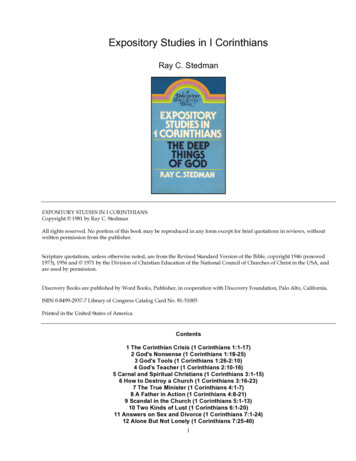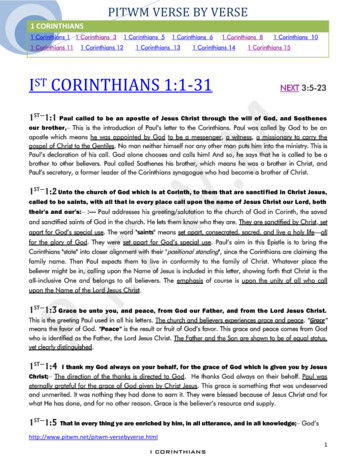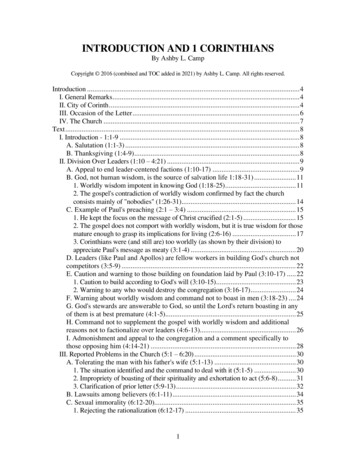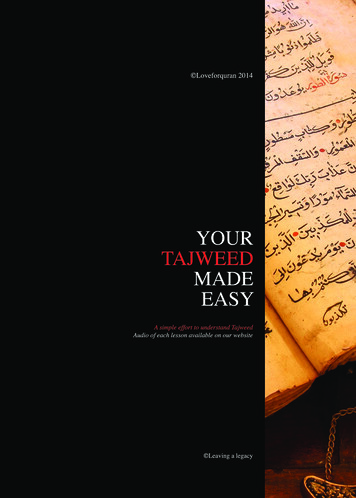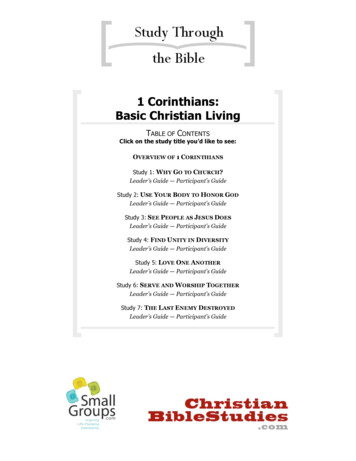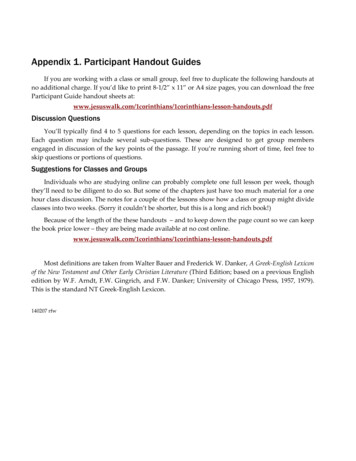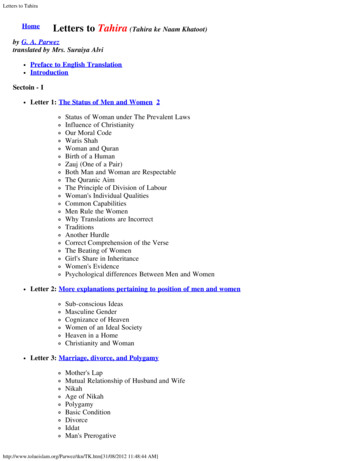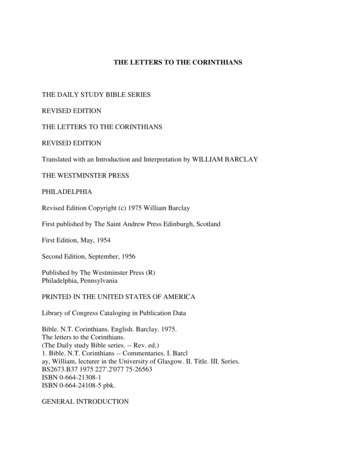
Transcription
THE LETTERS TO THE CORINTHIANSTHE DAILY STUDY BIBLE SERIESREVISED EDITIONTHE LETTERS TO THE CORINTHIANSREVISED EDITIONTranslated with an Introduction and Interpretation by WILLIAM BARCLAYTHE WESTMINSTER PRESSPHILADELPHIARevised Edition Copyright (c) 1975 William BarclayFirst published by The Saint Andrew Press Edinburgh, ScotlandFirst Edition, May, 1954Second Edition, September, 1956Published by The Westminster Press (R)Philadelphia, PennsylvaniaPRINTED IN THE UNITED STATES OF AMERICALibrary of Congress Cataloging in Publication DataBible. N.T. Corinthians. English. Barclay. 1975.The letters to the Corinthians.(The Daily study Bible series. -- Rev. ed.)1. Bible. N.T. Corinthians -- Commentaries. I. Barclay, William, lecturer in the University of Glasgow. II. Title. III. Series.BS2673.B37 1975 227'.2'077 75-26563ISBN 0-664-21308-1ISBN 0-664-24108-5 pbk.GENERAL INTRODUCTION
The Daily Study Bible series has always had one aim--to convey the results of scholarship to theordinary reader. A. S. Peake delighted in the saying that he was a "theological middleman", and Iwould be happy if the same could be said of me in regard to these volumes. And yet the primaryaim of the series has never been academic. It could be summed up in the famous words ofRichard of Chichester's prayer--to enable men and women "to know Jesus Christ more clearly, tolove him more dearly, and to follow him more nearly".It is all of twenty years since the first volume of The Daily Study Bible was published. The serieswas the brain-child of the late Rev. Andrew McCosh, M.A., S.T.M., the then Secretary andManager of the Committee on Publications of the Church of Scotland, and of the late Rev. R. G.Macdonald, O.B.E., M.A., D.D., its Convener.It is a great joy to me to know that all through the years The Daily Study Bible has been used athome and abroad, by minister, by missionary, by student and by layman, and that it has beentranslated into many different languages. Now, after so many printings, it has become necessaryto renew the printer's type and the opportunity has been taken to restyle the books, to correctsome errors in the text and to remove some references which have become outdated. At the sametime, the Biblical quotations within the text have been changed to use the Revised StandardVersion, but my own original translation of the New Testament passages has been retained at thebeginning of each daily section.There is one debt which I would be sadly lacking in courtesy if I did not acknowledge. The workof revision and correction has been done entirely by the Rev. James Martin, M.A., B.D., ministerof High Carntyne Church, Glasgow. Had it not been for him this task would never have beenundertaken, and it is impossible for me to thank him enough for the selfless toil he has put intothe revision of these books.It is my prayer that God may continue to use The Daily Study Bible to enable men better tounderstand His word.Glasgow WILLIAM BARCLAYCONTENTSGeneral IntroductionA General Introduction to the Letters of Paul1 CORINTHIANSIntroduction to the Letters to the CorinthiansAn Apostolic Introduction (1 Cor. 1:1-3)The Necessity of Thanksgiving (1 Cor. 1:4-9)A Divided Church (1 Cor. 1:10-17)A Stumbling-block to the Jews and Foolishness to the Greeks (1 Cor. 1:18-25)
The Glory of the Shame (1 Cor. 1:26-31)The Proclamation and the Power (1 Cor. 2:1-5)The Wisdom which is from God (1 Cor. 2:6-9)Spiritual Things to Spiritual Men (1 Cor. 2:10-16)The Supreme Importance of God (1 Cor. 3:1-9)The Foundation and the Builders (1 Cor. 3:10-15)Wisdom and Foolishness (1 Cor. 3:16-22)The Three Judgments (1 Cor. 4:1-5)Apostolic Humility and Unchristian Pride (1 Cor. 4:6-13)A Father in the Faith (1 Cor. 4:14-21)Sin and Complacency (1 Cor. 5:1-8)The Church and the World (1 Cor. 5:9-13)The Folly of the Law Courts (1 Cor. 6:1-8)Such were Some of You (1 Cor. 6:9-11)Bought with a Price (1 Cor. 6:12-20)Complete Asceticism (1 Cor. 7:1-2)The Partnership of Marriage (1 Cor. 7:3-7)The Bond that Must not be Broken (1 Cor. 7:8-16)Serving God where God has Set Us (1 Cor. 7:17-24)Wise Advice on a Difficult Problem (1 Cor.7:25,36-38)The Time is Short (1 Cor. 7:26-35)Marrying Again (1 Cor.7:39-40)Advice to the Wise (1 Cor. 8)The Unclaimed Privileges (1 Cor. 9:1-14)The Privilege and the Task (1 Cor. 9:15-23)A Real Fight (1 Cor. 9:24-27)The Peril of Over-confidence (1 Cor. 10:1-13)The Sacramental Obligation (1 Cor. 10:14-22)The Limits of Christian Freedom (1 Cor. 10:23-11:1)The Necessary Modesty (1 Cor. 11:2-16)The Wrong Kind of Feast (1 Cor. 11:17-22)The Lord's Supper (1 Cor. 11:23-34)The Confession of the Spirit (1 Cor. 12:1-3)God's Differing Gifts (1 Cor. 12:4-11)The Body of Christ (1 Cor. 12:12-31)The Hymn of Love (1 Cor. 13)The Nature of Christian Love (1 Cor. 13:4-7)The Supremacy of Love (1 Cor. 13:8-13)The False and the True Worship (1 Cor. 14:1-19)The Effects of False and True Worship (1 Cor. 14:20-25)Practical Advice (1 Cor. 14:26-33)Forbidden Innovations (1 Cor. 14:34-40)Jesus' Resurrection and Ours (1 Cor. 15)The Risen Lord (1 Cor. 15:1-11)If Christ Be Not Raised (1 Cor. 15:12-19)The First-Fruits of those that Sleep (1 Cor. 15:20-28)
If There Is No Resurrection (1 Cor. 15:29-34)The Physical and the Spiritual (1 Cor. 15:35-49)The Conquest of Death (1 Cor. 15:50-58)Practical Plans (1 Cor. 16:1-12)Closing Words and Greetings (1 Cor. 16:13-21)2 CORINTHIANSComforted to Comfort (2 Cor. 1:1-7)Driven Back on God (2 Cor. 1:8-11)Our Only Boast (2 Cor. 1:12-14)God's Yes in Jesus Christ (2 Cor. 1:15-22)When a Saint Rebukes (2 Cor. 1:23-2:4)Pleading for a Sinner's Pardon (2 Cor. 2:5-11)In the Triumph of Christ (2 Cor. 2:12-17)Each Man a Letter of Christ (2 Cor. 3:1-3)The Surpassing Glory (2 Cor. 3:4-11)The Veil which Hides the Truth (2 Cor. 3:12-18)The Blinded Eye (2 Cor. 4:1-6)Tribulation and Triumph (2 Cor. 4:7-15)The Secret of Endurance (2 Cor. 4:16-18)Joy and Judgment to Come (2 Cor. 5:1-10)The New Creation (2 Cor. 5:11-19)Ambassador for Christ (2 Cor. 5:20-6:2)A Blizzard of Troubles (2 Cor. 6:3-10)The Accent of Love (2 Cor. 6:11-13; 1 Cor. 7:2-4)Get You Out! (2 Cor. 6:14-7:1)Godly Sorrow and Godly Joy (2 Cor. 7:5-16)An Appeal for Generosity (2 Cor. 8:1-15)Practical Arrangements (2 Cor. 8:16-24)The Willing Giver (2 Cor. 9:1-5)The Principles of Generosity (2 Cor. 9:6-15)Paul Begins to Answer His Critics (2 Cor. 10:1-6)Paul Continues to Answer His Critics (2 Cor. 10:7-18)The Peril of Seduction (2 Cor. 11:1-6)Masquerading as Christians (2 Cor. 11:7-15) The Credentials of an Apostle (2 Cor. 11:16-33)The Thorn and the Grace (2 Cor. 12:1-10)The Defence Draws to an End (2 Cor. 12:11-18)The Marks of an Unchristian Church (2 Cor. 1 2:19-21)A Warning, a Wish, a Hope, and a Blessing (2 Cor. 13)Further ReadingA GENERAL INTRODUCTION TO THE LETTERS OF PAULTHE LETTERS OF PAUL
There is no more interesting body of documents in the New Testament than the letters of Paul.That is because of all forms of literature a letter is most personal. Demetrius, one of the oldGreek literary critics, once wrote, "Every one reveals his own soul in his letters. In every otherform of composition it is possible to discern the writer's character, but in none so clearly as theepistolary." (Demetrius, On Style, 227). It is just because he left us so many letters that we feelwe know Paul so well. In them he opened his mind and heart to the folk he loved so much; and inthem, to this day, we can see that great mind grappling with the problems of the early church,and feel that great heart throbbing with love for men, even when they were misguided andmistaken.THE DIFFICULTY OF LETTERSAt the same time, there is often nothing so difficult to understand as a letter. Demetrius (OnStyle, 223) quotes a saying of Artemon, who edited the letters of Aristotle. Artemon said that aletter ought to be written in the same manner as a dialogue, because it was one of the two sidesof a dialogue. In other words, to read a letter is like listening to one side of a telephoneconversation. So when we read the letters of Paul we are often in a difficulty. We do not possessthe letter which he was answering; we do not fully know the circumstances with which he wasdealing; it is only from the letter itself that we can deduce the situation which prompted it.Before we can hope to understand fully any letter Paul wrote, we must try to reconstruct thesituation which produced it.THE ANCIENT LETTERSIt is a great pity that Paul's letters were ever called epistles. They are in the most literal senseletters. One of the great lights shed on the interpretation of the New Testament has been thediscovery and the publication of the papyri. In the ancient world, papyrus was the substance onwhich most documents were written. It was composed of strips of the pith of a certain bulrushthat grew on the banks of the Nile. These strips were laid one on top of the other to form asubstance very like brown paper. The sands of the Egyptian desert were ideal for preservation,for papyrus, although very brittle, will last forever so long as moisture does not get at it. As aresult, from the Egyptian rubbish heaps, archaeologists have rescued hundreds of documents,marriage contracts, legal agreements, government forms, and, most interesting of all, privateletters. When we read these private letters we find that there was a pattern to which nearly allconformed; and we find that Paul's letters reproduce exactly that pattern. Here is one of theseancient letters. It is from a soldier, called Apion, to his father Epimachus. He is writing fromMisenum to tell his father that he has arrived safely after a stormy passage."Apion sends heartiest greetings to his father and lord Epimachus. I pray above all that you arewell and fit; and that things are going well with you and my sister and her daughter and mybrother. I thank my Lord Serapis [his god] that he kept me safe when I was in peril on the sea. Assoon as I got to Misenum I got my journey money from Caesar--three gold pieces. And thingsare going fine with me. So I beg you, my dear father, send me a line, first to let me know howyou are, and then about my brothers, and thirdly, that I may kiss your hand, because you broughtme up well, and because of that I hope, God willing, soon to be promoted. Give Capito myheartiest greetings, and my brothers and Serenilla and my friends. I sent you a little picture of
myself painted by Euctemon. My military name is Antonius Maximus, I pray for your goodhealth. Serenus sends good wishes, Agathos Daimon's boy, and Turbo, Gallonius' son." (G.Milligan, Selections from the Greek Papyri, 36).Little did Apion think that we would be reading his letter to his father 1800 years after he hadwritten it. It shows how little human nature changes. The lad is hoping for promotion quickly.Who will Serenilla be but the girl he left behind him? He sends the ancient equivalent of aphotograph to the folk at home. Now that letter falls into certain sections. (i) There is a greeting.(ii) There is a prayer for the health of the recipients. (iii) There is a thanksgiving to the gods. (iv)There are the special contents. (v) Finally, there are the special salutations and the personalgreetings. Practically every one of Paul's letters shows exactly the same sections, as we nowdemonstrate.(i) The Greeting: Rom. 1:1; 1 Cor. 1:1; 2 Cor. 1:1; Gal. 1:1; Eph. 1:1; Php. 1:1; Col. 1:1-2; 1Th.1:1; 2Th. 1:1.(ii) The Prayer: in every case Paul prays for the grace of God on the people to whom he writes:Rom. 1:7; 1 Cor. 1:3; 2 Cor. 1:2; Gal. 1:3; Eph. 1:2; Php. 1:3; Col. 1:2; 1Th. 1:1; 2Th. 1:2.(ill) The Thanksgiving: Rom. 1:8; 1 Cor. 1:4; 2 Cor. 1:3; Eph. 1:3; Php. 1:3; 1Th. 1:3; 2Th. 1:3.(iv) The Special Contents: the main body of the letters.(v) Special Salutations and Personal Greetings: Rom. 16; 1 Cor. 16:19; 2 Cor. 13:13; Php. 4:2122; Col. 4:12-15; 1Th. 5:26.When Paul wrote letters, he wrote them on the pattern which everyone used. Deissmann says ofthem, "They differ from the messages of the homely papyrus leaves of Egypt, not as letters butonly as the letters of Paul." When we read Paul's letters we are not reading things which weremeant to be academic exercises and theological treatises, but human documents written by afriend to his friends.THE IMMEDIATE SITUATIONWith a very few exceptions, all Paul's letters were written to meet an immediate situation and nottreatises which he sat down to write in the peace and silence of his study. There was somethreatening situation in Corinth, or Galatia, or Philippi, or Thessalonica, and he wrote a letter tomeet it. He was not in the least thinking of us when he wrote, but solely of the people to whomhe was writing. Deissmann writes, "Paul had no thought of adding a few fresh compositions tothe already extant Jewish epistles; still less of enriching the sacred literature of his nation. Hehad no presentiment of the place his words would occupy in universal history; not so much thatthey would be in existence in the next generation, far less that one day people would look atthem as Holy Scripture." We must always remember that a thing need not be transient because itwas written to meet an immediate situation. All the great love songs of the world were writtenfor one person, but they live on for the whole of mankind. It is just because Paul's letters werewritten to meet a threatening danger or a clamant need that they still throb with life. And it is
because human need and the human situation do not change that God speaks to us through themtoday.THE SPOKEN WORDOne other thing we must note about these letters. Paul did what most people did in his day. Hedid not normally pen his own letters but dictated them to a secretary, and then added his ownauthenticating signature. (We actually know the name of one of the people who did the writingfor him. In Rom.16:22 Tertius, the secretary, slips in his own greeting before the letter draws toan end). In 1 Cor.16:21 Paul says, "This is my own signature, my autograph, so that you can besure this letter comes from me." (compare Col.4:18; 2Th.3:17.)This explains a great deal. Sometimes Paul is hard to understand, because his sentences beginand never finish; his grammar breaks down and the construction becomes involved. We must notthink of him sitting quietly at a desk, carefully polishing each sentence as he writes. We mustthink of him striding up and down some little room, pouring out a torrent of words, while hissecretary races to get them down. When Paul composed his letters, he had in his mind's eye avision of the folk to whom he was writing, and he was pouring out his heart to them in wordsthat fell over each other in his eagerness to help.INTRODUCTION TO THE LETTERS TO THE CORINTHIANSTHE GREATNESS OF CORINTHA glance at the map will show that Corinth was made for greatness. The southern part of Greeceis very nearly an island. On the west the Corinthian Gulf deeply indents the land and on the eastthe Saronic Gulf. All that is left to join the two parts of Greece together is a little isthmus onlyfour miles across. On that narrow neck of land Corinth stands. Such a position made it inevitablethat it should be one of the greatest trading and commercial centres of the ancient world. Alltraffic from Athens and the north of Greece to Sparta and the Peloponnese had to be routedthrough Corinth, because it stood on the little neck of land that connected the two.Not only did the north to south traffic of Greece pass through Corinth of necessity, by far thegreater part of the east to west traffic of the Mediterranean passed through her from choice. Theextreme southern tip of Greece was known as Cape Malea (now called Cape Matapan). It wasdangerous, and to round Cape Malea had much the same sound as to round Cape Horn had inlater times. The Greeks had two sayings which showed what they thought of it--"Let him whosails round Malea forget his home," and, "Let him who sails round Malea first make his will."The consequence was that mariners followed one of two courses. They sailed up the SaronicGulf, and, if their ships were small enough, dragged them out of the water, set them on rollers,hauled them across the isthmus, and re-launched them on the other side. The isthmus wasactually called the Diolkos, the place of dragging across. The idea is the same as that which iscontained in the Scottish place name Tarbert, which means a place where the land is so narrowthat a boat can be dragged from loch to loch. If that course was not possible because the ship wastoo large, the cargo was disembarked, carried by porters across the isthmus, and re-embarked on
another ship at the other side. This four mile journey across the isthmus, where the Corinth Canalnow runs, saved a journey of two hundred and two miles round Cape Malea, the most dangerouscape in the Mediterranean.It is easy to see how great a commercial city Corinth must have been. The north to south trafficof Greece had no alternative but to pass through her; by far the greater part of the east to westtrade of the Mediterranean world chose to pass through her. Round Corinth there clustered threeother towns, Lechaeum at the west end of the isthmus, Cenchrea at the east end and Schoenusjust a short distance away. Farrar writes, "Objects of luxury soon found their way to the marketswhich were visited by every nation in the civilized world--Arabian balsam, Phoenician dates,Libyan ivory, Babylonian carpets, Cilician goats' hair, Lycaonian wool, Phrygian slaves."Corinth, as Farrar calls her, was the Vanity Fair of the ancient world. Men called her The Bridgeof Greece; one called her The Lounge of Greece. It has been said that if a man stands longenough in Piccadilly Circus he will in the end meet everyone in the country. Corinth was thePiccadilly Circus of the Mediterranean. To add to the concourse which came to it, Corinth wasthe place where the Isthmian Games were held, which were second only to the Olympics.Corinth was a rich and populous city with one of the greatest commercial trades in the ancientworld.THE WICKEDNESS OF CORINTHThere was another side to Corinth. She had a reputation for commercial prosperity, but she wasalso a byword for evil living. The very word korinthiazesthai, to live like a Corinthian, hadbecome a part of the Greek language, and meant to live with drunken and immoral debauchery.The word actually penetrated to the English language, and, in Regency times, a Corinthian wasone of the wealthy young bucks who lived in reckless and riotous living. Aelian, the late Greekwriter, tells us that if ever a Corinthian was shown upon the stage in a Greek play he was showndrunk. The very name Corinth was synonymous with debauchery and there was one source ofevil in the city which was known all over the civilized world. Above the isthmus towered the hillof the Acropolis, and on it stood the great temple of Aphrodite, the goddess of love. To thattemple there were attached one thousand priestesses who were sacred prostitutes, and in theevenings they descended from the Acropolis and plied their trade upon the streets of Corinth,until it became a Greek proverb, "It is not every man who can afford a journey to Corinth." Inaddition to these cruder sins, there flourished far more recondite vices, which had come in withthe traders and the sailors from the ends of the earth, until Corinth became not only a synonymfor wealth and luxury, drunkenness and debauchery, but also for filth.THE HISTORY OF CORINTHThe history of Corinth falls into two parts. She was a very ancient city. Thucydides, the Greekhistorian, claims that it was in Corinth that the first triremes, the Greek battleships, were built.Legend has it that it was in Corinth that the Argo was built, the ship in which Jason sailed theseas, searching for the golden fleece. But in 146 B.C. disaster befell her. The Romans wereengaged in conquering the world. When they sought to reduce Greece, Corinth was the leader of
the opposition. But the Greeks could not stand against the disciplined Romans, and in 146 B.C.Lucius Mummius, the Roman general, captured Corinth and left her a desolate heap of ruins.But any place with the geographical situation of Corinth could not remain a devastation. Almostexactly one hundred years later, in 46 B.C. Julius Caesar rebuilt her and she arose from her ruins.Now she became a Roman colony. More, she became a capital city, the metropolis of the Romanprovince of Achaea, which included practically all Greece.In those days, which were the days of Paul, her population was very mixed. (i) There were theRoman veterans whom Julius Caesar had settled there. When a Roman soldier had served histime, he was granted the citizenship and was then sent out to some newly-founded city and givena grant of land so that he might become a settler there. These Roman colonies were planted allover the world, and always the backbone of them was the contingent of veteran regular soldierswhose faithful service had won them the citizenship. (ii) When Corinth was rebuilt the merchantscame back, for her situation still gave her commercial supremacy. (iii) There were many Jewsamong the population. The rebuilt city offered them commercial opportunities which they werenot slow to take. (iv) There was a sprinkling of Phoenicians and Phrygians and people from theeast, with their exotic customs and their hysterical ways. Farrar speaks of "this mongrel andheterogeneous population of Greek adventurers and Roman bourgeois, with a tainting infusion ofPhoenicians; this mass of Jews, ex-soldiers, philosophers, merchants, sailors, freedmen, slaves,trades-people, hucksters and agents of every form of vice." He characterizes her as a colony"without aristocracy, without traditions and without well-established citizens."Remember the background of Corinth, remember its name for wealth and luxury, fordrunkenness and immorality and vice, and then read 1 Cor.6:9-10.Are you not aware that the unrighteous will not inherit the Kingdom of God? Make no mistake-neither fornicators, nor idolaters, nor adulterers, nor sensualists, nor homosexuals, nor thieves,nor rapacious men, nor drunkards, nor slanderers, nor robbers shall inherit the Kingdom of God-and such were some of you.In this hotbed of vice, in the most unlikely place in all the Greek world, some of Paul's greatestwork was done, and some of the mightiest triumphs of Christianity were won.PAUL IN CORINTHPaul stayed longer in Corinth than in any other city, with the single exception of Ephesus. Hehad left Macedonia with his life in peril and had crossed over to Athens. There he had had littlesuccess and had gone on to Corinth, and he remained there for eighteen months. We realize howlittle we really know of his work when we see that the whole story of that eighteen months iscompressed by Luke into 17 verses (Ac.18:1-17).When Paul arrived in Corinth he took up residence with Aquila and Prisca. He preached in thesynagogue with great success. With the arrival of Timothy and Silas from Macedonia, heredoubled his efforts, but the Jews were so stubbornly hostile that he had to leave the synagogue.He took up his residence with one Justus who lived next door to the synagogue. His most notable
convert was Crispus, who was actually the ruler of the synagogue, and amongst the generalpublic he had good success.In the year A.D. 52 there came to Corinth as its new governor a Roman called Gallio. He wasfamous for his charm and gentleness. The Jews tried to take advantage of his newness and goodnature and brought Paul to trial before him on a charge of teaching contrary to their law. ButGallio, with impartial Roman justice, refused to have anything to do with the case or to take anyaction. So Paul completed his work in Corinth and moved on to Syria.THE CORRESPONDENCE WITH CORINTHIt was when he was in Ephesus in the year A.D. 55 that Paul, learning that things were not allwell in Corinth, wrote to the church there. There is every possibility that the Corinthiancorrespondence as we have it is out of order. We must remember that it was not until A.D. 90 orthereby that Paul's correspondence was collected. In many churches it must have existed only onscraps of papyrus and the putting it together would be a problem: and it seems that, when theCorinthian letters were collected, they were not all discovered and were not arranged in the rightorder. Let us see if we can reconstruct what happened.(i) There was a letter which preceded 1 Corinthians. In 1 Cor.5:9 Paul writes, "I wrote you aletter not to associate with immoral men." This obviously refers to some previous letter. Somescholars believe that letter is lost without trace. Others think it is contained in 2 Cor.6:14-18 and2 Cor.7:1. Certainly that passage suits what Paul said he wrote about. It occurs rather awkwardlyin its context, and, if we take it out and read straight on from 2 Cor.6:13 to 2 Cor.7:2, we getexcellent sense and connection. Scholars call this letter The Previous Letter. (In the originalletters there were no chapter or verse divisions. The chapters were not divided up until thethirteenth century and the verses not till the sixteenth, and because of that the arranging of thecollection of letters would be much more difficult).(ii) News came to Paul from various sources of trouble at Corinth. (a) News came from thosewho were of the household of Chloe (1 Cor.1:11). They brought news of the contentions withwhich the church was torn. (b) News came with the visit of Stephanas, Fortunatus and Achaicusto Ephesus. (1 Cor.16:17). By personal contact they were able to fill up the gaps in Paul'sinformation. (c) News came in a letter in which the Corinthian Church had asked Paul's;guidance on various problems. In 1 Cor.7:1 Paul begins, "Concerning the matters about whichyou wrote." In answer to all this information Paul wrote 1 Corinthians and despatched it toCorinth apparently by the hand of Timothy (1 Cor.4:17).(iii) The result of the letter was that things became worse than ever, and, although we have nodirect record of it, we can deduce that Paul paid a personal visit to Corinth. In 2 Cor.12:14 hewrites, "The third time I am ready to come to you." In 2 Cor.13:1-2, he says again that he iscoming to them for the third time. Now, if there was a third time, there must have been a secondtime. We have the record of only one visit, whose story is told in Ac.18:1-17. We have no recordat all of the second, but Corinth was only two or three days' sailing from Ephesus.
(iv) The visit did no good at all. Matters were only exacerbated and the result was an exceedinglysevere letter. We learn about that letter from certain passages in 2 Corinthians. In 2 Cor.2:4 Paulwrites, "I wrote to you out of much affliction and anguish of heart and with many tears." In 2Cor.7:8 he writes, "For even if I made you sorry with my letter, I do not regret it though I didregret it; for I see that that letter has grieved you, though only for a while." It was a letter whichwas the product of anguish of mind, a letter so severe that Paul was almost sorry that he ever sentit.Scholars call this The Severe Letter. Have we got it? It obviously cannot be I Corinthians,because it is not a tear-stained and anguished letter. When Paul wrote it, it is clear enough thatthings were under control. Now if we read through 2 Corinthians we find an odd circumstance.In 2 Cor.1-9 everything is made up, there is complete reconciliation and all are friends again; butat 2 Cor.10 comes the strangest break. 2 Cor.10-13 are the most heartbroken cry Paul ever wrote.They show that he has been hurt and insulted as he never was before or afterwards by anychurch. His appearance, his speech, his apostleship, his honesty have all been under attack.Most scholars believe that 2 Cor.10-13 are the severe letter, and that they have becomemisplaced when Paul's letters were put together. If we want the real chronological course ofPaul's correspondence with Corinth, we really ought to read 2 Cor.10-13 before 2 Cor.1-9. Wedo know that this letter was sent off with Titus. (2 Cor.2:13; 2 Cor.7:13).(v) Paul was worried about this letter. He could not wait until Titus came back with an answer,so he set out to meet him (2 Cor.2:13; 2 Cor.7:5,13). Somewhere in Macedonia he met him andlearned that all was well, and, probably at Philippi, he sat down and wrote 2 Cor.1-9, the letter ofreconciliation.Stalker has said that the letters of Paul take the roof off the early churches and let us see whatwent on inside. Of none of them is that truer than the letters to Corinth. Here we see what "thecare of all the churches" must have meant to Paul. Here we see the heart-breaks and the joys.Here we see Paul, the shepherd of his flock, bearing the sorrows and the problems of his peopleon his heart.THE CORINTHIAN CORRESPONDENCEBefore we read the letters in detail let us set down the progress of the Corinthian correspondencein tabular form.(i) The Previous Letter, which may be contained in 2 Cor.6:14-18 and 2 Cor.7:1.(ii) The arrival of Chloe's people, of Stephanas, Fortunatus and Achaicus, and of the letter toPaul from the Corinthian Church.(iii) 1 Corinthians is written in reply and is despatched with Timothy.(iv) The situation grows worse and Paul pays a personal visit to Corinth, which is so complete afailure that it almost breaks his heart.
(v) The consequence is The Severe Letter, which is almost certainly contained in 2 Cor.10-13,and which was despatched with Titus.(vi) Unable to wait for an answer, Paul sets out to meet Titus. He meets him in Macedonia,learns that all is well and, probably from Philippi, writes 2 Cor.1-9, The Letter of Reconciliation.The first four chapters of 1 Corinthians deal with the divided state of the Church of God atCorinth. Instead of being a unity in Christ it was split into sects and parties, who had attachedthemselves to the names of various leaders and teachers. It is Paul's teaching that these divisionshad emerged because th
1 CORINTHIANS Introduction to the Letters to the Corinthians An Apostolic Introduction (1 Cor. 1:1-3) The Necessity of Thanksgiving (1 Cor. 1:4-9) A Divided Church (1 Cor. 1:10-17) A Stumbling-block to the Jews and Foolishness to the
